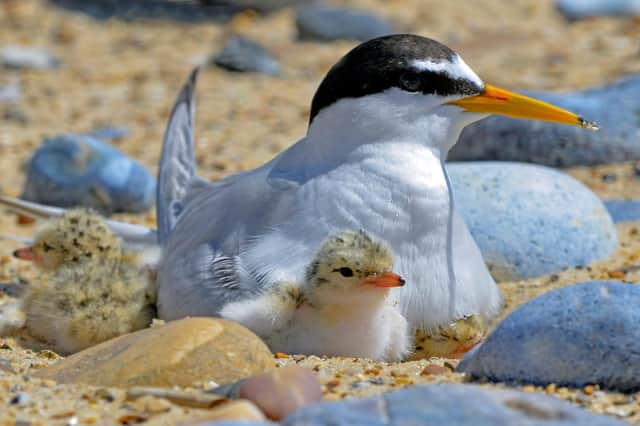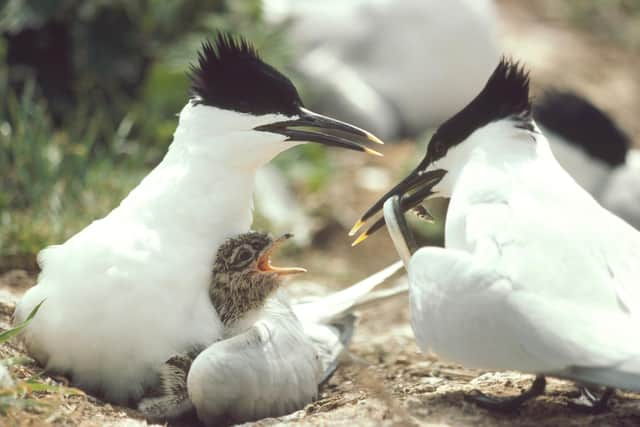RSPB reveals how helping birds to breed is easier than you may think


We all need room to breathe and it turns out that our feathered friends are no exception- especially when it comes to breeding.
Spring is upon us and as Mother Nature weaves fresh colours into the landscape, renewal is in the air.
Advertisement
Hide AdAdvertisement
Hide AdWith the breeding season underway, birds and other wildlife prepare nests and raise their young on nature reserves; in gardens and green spaces; and in the wider countryside.


And supporting them to thrive is simpler than we may realise.
To help give birds the best chance this spring, we should give nest sites a wide berth, according to the Royal Society for the Protection of Birds (RSPB).
The charity, which manages almost 159,000 hectares of land across the UK, says that disturbing nesting birds uses up the precious energy reserves of parent birds and can even cause them to abandon their young, with some species not then breeding again until the following year.
Advertisement
Hide AdAdvertisement
Hide AdThe success of this approach appears to be borne out by the RSPB’s own experience.
A report into how wildlife fared on the charity’s nature reserves last year found that a range of species have increased rates of breeding success when given safe spaces to nest and raise their young.
Covering all 222 RSPB nature reserves throughout the UK, the report reveals the ups and downs of the 2021 bird breeding season, as well as other wildlife, and highlights the importance of both nature reserves and targeted conservation work across a range of habitats in order to support individual species.
“Looking back on how wildlife has fared on our nature reserves in 2021 has been a fantastic insight into what can be achieved when ambitious conservation action is combined with the phenomenal team effort of our staff and volunteers in managing, monitoring and surveying wildlife on RSPB reserves,” said Katie-Jo Luxton, the RSPB’s conservation director.
Advertisement
Hide AdAdvertisement
Hide AdThanks to the dedicated spaces that nature reserves provide, wading birds such as lapwings and redshanks fared well at a number of RSPB reserves last year.
Bucking declining trends nationally, the highest ever number of both lapwing and redshank were found in the Greater Thames area at RSPB Rainham Marshes and RSPB Wallasea Island in 2021.
Both RSPB Loch Gruinart in Scotland and RSPB Burton Mere Wetlands in Cumbria also celebrated the highest ever numbers of breeding redshank, with the latter nature reserve having one of the highest densities of breeding waders in the UK last year.
Terns also nest at ground level and are often found on beaches and high tide lines.
Advertisement
Hide AdAdvertisement
Hide AdAt risk of abandoning their nests and chicks if they are accidentally disturbed by people and their dogs, these birds are particularly vulnerable in the face of climate change and rising sea levels.
RSPB Coquet Island, a sanctuary for seabirds on the Northumberland coast, saw a bumper year in 2021, with record-breaking numbers of roseate, Sandwich and common terns recorded.
Meanwhile, at RSPB Pagham Harbour in West Sussex, little tern and Sandwich tern pairs reached their highest numbers since the RSPB began managing the reserve, and Northern Ireland’s RSPB Larne Lough Islands saw numbers of Sandwich terns increase too, totalling more than 1,100 pairs.
Last year was also the best breeding year yet for cranes, our tallest bird here in the UK. They are extremely sensitive and tend to breed on dedicated areas of nature reserves that are kept free from disturbance.
Advertisement
Hide AdAdvertisement
Hide AdOnce a species extinct in Britain, cranes began to recolonise the UK in the 1970s, spreading from Norfolk to further afield and rising in number thanks to conservation efforts.
One of the highlights from their record-breaking year in 2021 was the fledging of the first young crane in Oxfordshire for 500 years at RSPB Otmoor.
“Our nature reserves offer hope that with the right focus and effort, it is possible to restore threatened wildlife, especially in the face of the huge pressures on the natural world posed by the nature and climate emergency,” said Katie-Jo.
As the UK’s largest conservation charity, the RSPB’s nature reserves support more than 18,500 species and welcome hundreds of thousands of visitors each year.
Advertisement
Hide AdAdvertisement
Hide Ad“Whether you’re visiting an RSPB reserve or the wider countryside, we can all help to protect ground nesting birds by simply being mindful of nests and watching our step,” said Katie-Jo.
“If you see an alarmed adult bird or come across a nest, be sure to keep your distance and give nature the space it needs this breeding season.”
The RSPB also advises people to check for nests before doing any garden maintenance.
Birds can nest in all manner of places, says the charity: as well as in trees and shrubs, they can nest on the ground and in sheds; there have even been reports of robins nesting in a rubbish bin.
All birds and their active nests are protected by law.
To find out more visit: https://www.rspb.org.uk/